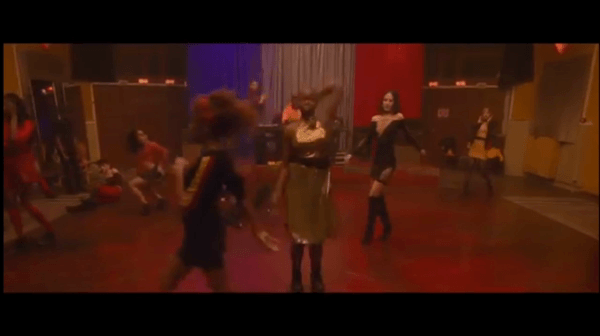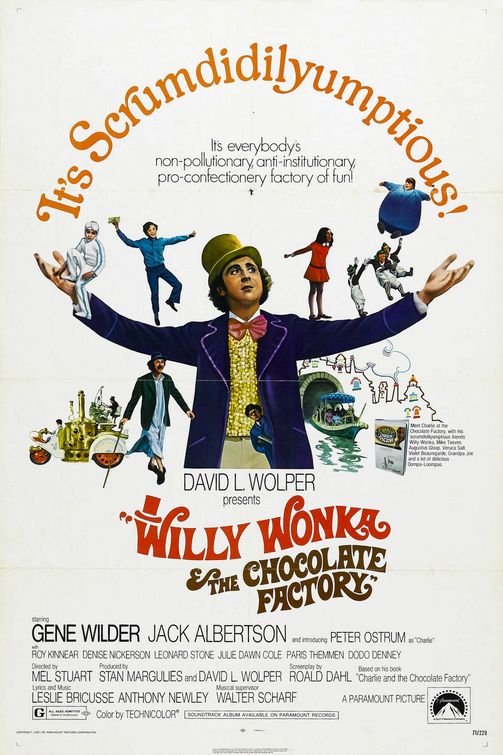
|

|
|

|
Willy Wonka and the Chocolate Factory
Based on the book by Roald Dahl
Plot (Spoiler Alert)Candy master, Willy Wonka, has hidden five Golden tickets in five Wonka bars. Who ever finds the tickets gets to go on a tour through his chocolate factory. For the past few years the gates to the factory have been closed and Willy Wonka hasn't shown his face until now. The mystery is what happens in that factory. One of the lucky ones who finds a Golden ticket is a young boy named Charlie Bucket. 
Blaine: Director Mel Stuart’s daughter had read the book and had told her father how great it was about a chocolate factory and she recommended that he make a movie out of it. Mel read the book and thought it was interesting. So he went to producer David L. Wolper and told him that his kid wants them to make the book into a picture and that he thought it was good idea. Somewhere close to that time they had some television show that they were doing for Quaker Oats and they were going to introduce a new candy bar. David had told one of the executives at Quaker Oats that he had a perfect movie to go with that. The executive read the book and thought it was a terrific idea and was all in favor of making the movie. He recommended that they release the movie around the same time their candy bar comes out to be a great promotion for a new candy bar. They decided to call it a Wonka Bar and so they changed the title of the movie from “Charlie and the Chocolate Factory” to “Willy Wonka and the Chocolate Factory". They put up the money to make the film. Mel Stuart couldn’t understand how an oatmeal company could put up the money for a movie because they weren’t a movie studio. The funded $3 million for the movie. The author of the book, Roald Dahl had written a script for the movie and they had brought in another writer David Seltzer because Mel and David felt there was a lot of elements that needed to be added. The villain Slugworth was created. The film was shot in Munich because Mel didn’t want to shoot it anywhere in the United States. He wanted the place to be something that was a fantasy place that you didn’t know where it was. David didn’t get credit for his work because he said the screenplay was really Roald Dahl’s and that he did the patchwork on it. Mel and David were in New York and ran into Gene Wilder. Right away Mel knew that Gene was the right person to play Willy Wonka. Gene took the job on condition that when Willy Wonka reveals himself to the public, he pretends to be a cripple because no one would know from that time on that he is lying or telling the truth. Mel and David discussed it and said “Okay”. In the book, Willy Wonka is frightening and rude, but Gene Wilder performance shows him that he is lovable. When they casted the kids there was no script yet, but they did have the book as an example of who these young characters were. They went to New York for a screen test of Peter Ostrum and after that they were certain that he was the right boy to play Charlie, but it wasn’t official until several weeks after that. Peter felt that Charlie had to be someone that all parents children want to be. He added a little bit of his own personality into the performance he gave. What I love about Peter’s performance is that he shows that Charlie has a huge passion for Willy Wonka’s work and idolizes him. He shows he is the good seed compared to the other children on the tour and he has the time of his life in that chocolate factory. And towards the end after Willy Wonka informs him that he has lost and that Wonka isn’t so nice, still he feels it’s not right to robbing someone of their work and selling it to someone else. Wonka knows that there is something about Charlie that he likes and he wants to believe that Charlie is the right one to put in charge of his factory. Wonka wants Charlie’s family to live in the factory too because they do a great job of raising a boy like him. No one knew how Gene Wilder was going to act in that scene when he is yelling out that Charlie has lost and it helped Peter’s performance in that scene. Michael Bollner (Augustus Gloop) saw the advertisement in the newspaper and his mom thought he was good enough to be in the movie. So they met with Mel in Grunewald, the place where the film was made, and Mel knew that Michael was right for the part as Augustus Gloop after just taking one look at him. Julie Dawn Cole (Veruca Salt) had to do her casting in a hotel and Mel kept telling Julie to get nastier. She was getting very annoyed and grumpy and just showed a performance that Mel was really amazed with coming from a child actor. Denise Nickerson (Violet Beauregarde) was living in New York City and she had three call backs for the role. Denise had been acting during her childhood and most most of the time was working with adults. She was very excited about being in “Willy Wonka” because she was able to work with kids. Paris Themmen (Mike Teavee) was a five year acting veteran. He auditioned in New York and wasn’t as different as any other audition he has done before that. Gene Wilder said he was a troublemaker back then. Some of the work the kids had to do wasn’t easy like Michael being in that tube that Augustus Gloop gets sucked up in or Denise wearing that big plastic whatever when Violet becomes a blueberry and the Oompa Loompas were rolling her around. 
They tried casting Oompa Loompas in Germany where the film was going to shoot, but it was hard to find actors at small height that could speak or understand english. They got some from Turkey and Malta, but the communication got a little difficult from time to time because there was few who spoke English. Harper Goff, the art director, Mel said is one of the great reasons for the success of “Willy Wonka” because he had an incredible imagination. The chocolate room with the boat was designed by him. Mel was amazed of all the work Harper did by get a river in there, get the waterfall to work and so on. The reactions the cast had when the door to the chocolate room opens was real because they hadn’t seen it until they started shooting that scene. The chocolate river was dirty cold water and it was a problem for Michael Bollner because he was the one who had to fall in. The buttercup Willy Wonka chews up was made of wax and when Mel yelled “cut”, Gene Wilder would spit it out. The idea of music came up when they were working on the structure of the movie. Mel wasn’t too big on there being music at first, but then he thought it could work if they had the right music. Producer Dave Wolper came through by having his good friends Anthony Newley and Leslie Bricusse, who were really great song writers. The music was completed before the screenplay. “The Candy Man” song was the big smash of the picture. David Seltzer had left the project believing his job was done and went on vacation. There was a problem with the ending to the script because what it said was that Grandpa says, “Yippee”. Mel Stuart did not want that because it sounded lame. Mel asked where David was and he was informed that David was on vacation in somewhere in Maine. Mel was desperate not to end the film with Grandpa saying “Yippee” and really needed David. Fortunately he found David and contacted him on a payphone near a lake where David was fishing. Mel had informed David that they can’t finish the movie with an ending that was weak. David had to think fast and the only thing that was on his mind was “They lived happily ever after”. Mel just stopped and thought “Fantastic”. So he ended that phone conversation and gave the line to Gene Wilder. Gene thought it was a wonderful ending. “Willy Wonka and the Chocolate Factory” wasn’t a success when it came out. Gene Wilder heard that mothers thought it was cruel to children. The children on the other hand loved it. Another problem was that the candy bar they promoted with the film would melt in stores. But the film became a classic. Peter Ostrum didn't pursue a career in acting. These days he’s a veterinarian in New York. From time to time he goes to public schools and speaks to them what he does as a veterinarian and also what he did in the past. He feels it’s important for kids to see the decisions that adults have made. Michael Bollner had done two or three side roles in German TV films after “Willy Wonka”, but his father felt he should go back to school. Today he is a tax and public accountant. After “Willy Wonka”, Denise Nickerson worked as an actress for another eight years and then she decided to get a new career. She quit acting and now she’s an accountant. Julie Dawn Cole went back to school after ‘Willy Wonka”. She carried on a career in acting and she well known in England. Paris Themmen continued acting until he was 14 or 15 and now he is an financial consultant. Mel Stuart felt he made a movie for adults to show them how bright children are. A mother came up to Gene Wilder once and told her children that he was Willy Wonka. She smiled at Gene and said “What a legacy.” That warms Gene’s heart hearing people say that because it’s true. It’a a great legacy. My rating on “Willy Wonka and the Chocolate Factory” is five out of five stars. Music Parodies The Simpsons Drunka Lunka song Homer wants to see the Oompa Loompa Blaine: There’s a “Simpsons” episode where Homer becomes the boss of garbage and the characters sing this song called “The Garbage Man” which is supposed to be like “The Candy Man”. Family Guy Episode: Wasted Talent Plot: Peter and his friends go on a drinking bridge to find a winning ticket inside a bottle Blaine: If you take a closer look at the tour group, you’ll see Charlie and Grandpa Joe in there. Futurama Episode: Fry and the Slurm Factory Plot: Fry and the group get a tour of the Slurms factory after he finds the winning bottle cap. Blaine: There’s something about a giant slug in a Willy Wonka outfit that cracks me up. 
Dexter’s Laboratory Episode: Golden Diskette Plot: Dexter tries to find the golden diskette in order to enter the laboratory of a brilliant professor who hardly shows himself. His annoying sister Dee Dee ends up winning one, but lucky thing for Dexter she has to take a guest with her. 
Robot Chicken That 70’s Show |